Assisted living is an engaging, compassionate, and secure adult residence option for many seniors. It provides an independent living choice for older adults to maintain their own living area and make their own daily decisions – but tempers that independence with a safe environment and experts to help should assistance be needed. While assisted living is often the only solution needed for a senior’s golden years, sometimes they may develop dementia or Alzheimer’s disease. This additional diagnosis may necessitate a transition to a memory care facility.

Memory care facilities offer more intensive and specialized oversight for those who live with Alzheimer’s disease or dementia. If a senior citizen who resides in an assisted living facility begins to experience diminished memory function, they may need to move to memory care. It can be challenging for a family to accept the reality that someone they love is declining in cognitive health. Still, the time may come that the transition may be necessary and in the best interest of the patient. Many assisted living facilities have memory care residences on the same campus, making the move less stressful and disruptive.
The Memory Care Transition
Memory is very often lost gradually, so it may be impossible to identify the specific optimum moment to move to memory care. Typically, individual safety ends up being the deciding factor for the family. Here are some other red flags that may indicate that moving to memory care is necessary.
They begin wandering.
Assisted living communities allow individuals to leave the facility at their own will and decide when to return. Although many residents no longer have a car, they can walk out the front doors on their own (generally with a process of signing in and out). If someone wanders out of the residence without knowing where they are – or informing the staff that they are leaving, they could put themselves in danger. In that case, freedom must be curtailed in order to protect the resident. A memory care center has stringent procedures in place to prevent a resident from wandering.
They experience disorientation.
A rising level of confusion or disorientation doesn’t always indicate a need for memory care, but sometimes it does. For instance, if someone gets lost on the way back to their apartment, or gets lost on their way to dinner, the assisted living staff may not be physically present immediately to ascertain the situation. There are more personnel assigned in a memory care setting than in assisted living, where daily life is much more independent. The team in a memory care facility are taught to provide specialized cueing and response to disoriented individuals.
They begin to act inappropriately.
One of the potential signs of increasing dementia is inappropriate behavior. The patient may act out sexually, exhibit aggressive behavior, or engage in self-harm. Typically, memory care facilities have fewer residents than assisted living communities, which permits increased monitoring and mitigation of inappropriate behaviors and habits.
They socially isolate.
People with mental health issues or dementia often feel very uncomfortable in social situations. Conversation and participation in social activities become difficult for those who struggle with communicating. Memory care centers promote and provide activities that can help those with cognitive difficulties. Memory care residents are encouraged to interact with other residents atr a level that is comfortable for them.
Their current caregivers recommend it.
A recommendation from the assisted living staff suggesting that your senior should move to memory care may compel a transition. Their observations of your loved ones behavior may come as a surprise to you, but is based upon their expertise and experience. You have the option of scheduling a meeting to discuss the motivating issues and any potential options. If the assisted living staff simply feels that the resident needs more care than they can provide, you may be able to schedule more time with your loved one, or arrange for an additional caregiver. You can also speak with their physician to see if any medications can delay or make a move unnecessary. If a transition is ultimately required, the staff at the assisted living will communicate with the memory care staff to ease the process for your loved one.
A Banyan Residence provides professional assisted living and memory care options in the Venice, Florida area. We are dedicated to working with our residents and their families to determine the best option for care, no matter the stage of life.
